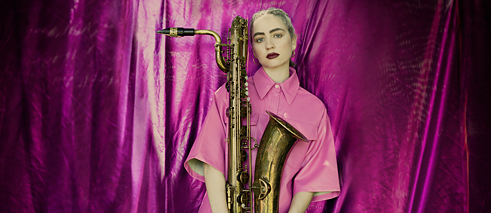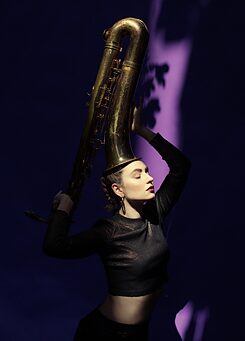An interview with the Saxophonist Kira Linn
“I fell in love with the saxophone”

In April 2023, German baritone saxophonist, singer and composer Kira Linn released her third album "Illusion" with her sextet, Linntett. Her recent album moves across genres including jazz, pop, indie, electro, neo-soul and RnB, with Linn adding her voice for the first time on a selection of tracks. Anger and powerlessness, as well as strength, diversity and freedom are core concepts and emotions that emerged during the pandemic and run through the new album.
In May 2023, Linn and her band Linntett will embark on their first-ever Southeast Asia tour, which includes Vietnam, Thailand, Indonesia, and Malaysia. In this interview, Kira Linn shares parts of her musical journey and tells us about the role models who inspired her.
Let’s go to the beginning of your musical career, do you remember your first encounter with the saxophone?
I sure can! When I was about nine or ten years old, I saw the daughter of my parents' friend play the saxophone, and I thought it was so cool that I wanted to play it too. In school, we had a class where every child learned an instrument, and we formed an orchestra. I had the chance to experiment with various brass instruments, but the saxophone was what I truly wanted to play. I tried the tenor saxophone, which is slightly smaller than the saxophone I currently play, and I immediately fell in love with it. From that point on, I became a member of my school's orchestra and big band. Eventually, I switched to the baritone saxophone, which is a much larger saxophone that produces a lower sound than the tenor.
Who have been your biggest inspirations throughout your musical career?
As a baritone saxophonist, Gerry Mulligan is one of my biggest inspirations. Typically, a baritone saxophone is used in a big band context, but Mulligan was part of a quartet that used the baritone as a melody instrument, and he also improvised on it. This inspired me to play the baritone saxophone as a solo instrument, as well as in a big band. He was also a significant influence on my sound. When I started studying, I drew inspiration from tenor saxophone players like Joe Lovano and Stan Getz. In terms of composition I draw a lot of inspiration from Maria Schneider and Guillermo Klein. Both of them are fantastic composers based in New York. More recently, listening to pop artists such as Billie Eilish and Bon Iver has inspired my latest album, which differs from my previous ones.
If we look at the contemporary jazz scene, female saxophonists are quite rare. How do you connect with and inspire other female saxophonists, and what opportunities do you get as a female saxophonist?
 Singing for the first time: In this newly released album, Linn tries to convey her emotions through lyrics.
| © Marina Rosa Weigl
It is unfortunate that female saxophonists are not prevalent in the jazz scene, but I believe this is changing. There are more female instrumentalists emerging, particularly in Cologne, where I live, and we have a strong community of female instrumentalists who support one another. We collaborate with each other, playing concerts together. Although few, female saxophonists such as Melissa Aldana from New York, who is an inspiration to me, have indeed made it to the top. Opportunities for female musicians are increasing, but at the beginning of my career, I felt like I had to prove myself to everyone. It wasn't easy because the jazz scene is male-dominated, and it's challenging to break into a "buddy business" where musicians tend to ask their friends to join their bands. I urge men in the jazz scene to be more proactive in inviting and encouraging female artists and instrumentalists to join their groups.
Singing for the first time: In this newly released album, Linn tries to convey her emotions through lyrics.
| © Marina Rosa Weigl
It is unfortunate that female saxophonists are not prevalent in the jazz scene, but I believe this is changing. There are more female instrumentalists emerging, particularly in Cologne, where I live, and we have a strong community of female instrumentalists who support one another. We collaborate with each other, playing concerts together. Although few, female saxophonists such as Melissa Aldana from New York, who is an inspiration to me, have indeed made it to the top. Opportunities for female musicians are increasing, but at the beginning of my career, I felt like I had to prove myself to everyone. It wasn't easy because the jazz scene is male-dominated, and it's challenging to break into a "buddy business" where musicians tend to ask their friends to join their bands. I urge men in the jazz scene to be more proactive in inviting and encouraging female artists and instrumentalists to join their groups.
Do you have any advice for young female jazz musicians who want to become professionals such as yourself?
To aspiring female jazz musicians, I advise them to empower themselves, adopt a positive mindset, and seek out role models. I always encourage young musicians to pursue this profession because it is such a cool and fulfilling career.
In 2016, you formed your sextet Linntett. Please tell us more about it.
I formed my sextet Linntett with the aim of creating a smaller ensemble that would capture the essence of big band music. I wanted to have a band with three saxophones—an alto, tenor, and baritone—as I knew that they blend well together. We also have a bass player, drummer, and piano player. The band has been together since 2016, and we have performed about 50 concerts over the last seven years. Our third album "Illusion" was just released.
Your recent album “Illusion” was composed while the pandemic was happening, in a time in which a lot of people lacked inspiration. How did you get inspired and motivated to create the album?
 Kira Linn’s recent album "Illusion" reflects the mixed emotions that she experienced during the pandemic.
| © Marina Rosa Weigl
Creating "Illusion" during the pandemic was a challenging process. At first, I felt like I had all the time in the world to compose, but as the pandemic dragged on, it became harder to stay motivated. The album reflects the mixed emotions that I experienced during this time. Although it was not an inspiration from the outside, I found that my feelings were intense, and I tried to express them through music and words. In fact, I sing on the album for the first time ever, as I felt that lyrics could convey my emotions in a more powerful way.
Kira Linn’s recent album "Illusion" reflects the mixed emotions that she experienced during the pandemic.
| © Marina Rosa Weigl
Creating "Illusion" during the pandemic was a challenging process. At first, I felt like I had all the time in the world to compose, but as the pandemic dragged on, it became harder to stay motivated. The album reflects the mixed emotions that I experienced during this time. Although it was not an inspiration from the outside, I found that my feelings were intense, and I tried to express them through music and words. In fact, I sing on the album for the first time ever, as I felt that lyrics could convey my emotions in a more powerful way.
Overall, creating "Illusion" was a cathartic experience for me, and I hope that it resonates with listeners who have also gone through difficult times during the pandemic.
On this third album, you are singing for the very first time. What inspired you?
I found myself deeply moved by many artists who use their voice to convey their emotions. Lyrics have a unique power to touch me in a way that pure music alone cannot. When the pandemic struck, I channeled my emotions into writing, and soon felt compelled to use my words to express my innermost thoughts and feelings. This was an entirely new experience for me. Without the opportunity to rehearse or perform, I turned to poetry for inspiration, which fueled my creative fire. And so I began to craft lyrics, then songs, and finally, I found myself singing them out loud. The authenticity of this creative journey resonates so deeply with me that I knew I had to incorporate it into my album.
Thank you for your time!
Thank you for taking the time to interview me, and I hope to inspire more young female musicians to pursue their dreams in the jazz scene.